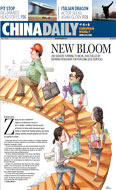Literary path
Updated: 2011-03-25 10:54
By Andrew Moody (China Daily European Weekly)
British expat takes lead in promoting modern Chinese literature to the rest of the world
Alexandra Pearson believes Westerners' perceptions of China are often in a time warp because they read books that record events now seen in the country as history. The 42-year-old has done more than anyone to bring that image up to date by promoting Chinese authors.
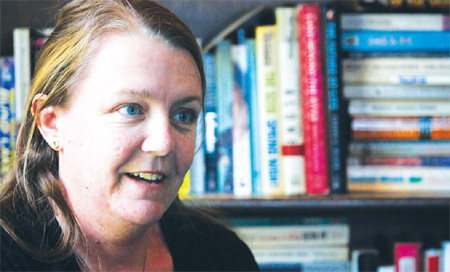 |
|
Alexandra Pearson says one must read books about today's China |
She is the driving force behind The Bookworm International Literary Festival, whose 5th annual incarnation just ended.
It not only brings literature from around the world to the fore in China but also promotes the talents of modern Chinese writers.
"A lot of the Chinese writers who people know in the West are people who now live outside of China and wrote their books some considerable time ago, but what about now?" she asks.
"You have people in America and all these places thinking that China is still about Mao (Zedong). However, if you ask a 20-year-old Chinese, it is about iPads, computer games, sex and rock and roll."
Not much of the latter is quite in evidence at The Bookworm, a restaurant, bookshop, library and literary events venue, which she founded in Beijing in 2005.
Nonetheless it is a unique cultural oasis in the Sanlitun area of the city and has now spawned two offshoots in Chengdu and Suzhou.
Pearson, Beijing's foremost literary society hostess, is very much home in the venue's main high-ceiling library containing thousands of books from the works of Confucius to John Grisham legal thrillers.
"A lot of what people read about China is about the 'cultural revolution' (1966-1976). China is viewed very one-dimensionally but there are many other aspects," she says.
"Who outside of China knows that Chinese writers write science fiction and that there is a whole following for science fiction writing in China?"
Leading Chinese writers at this year's festival have included A Yi, the up and coming Chinese crime writer who used to be a police officer, Sheng Keyi, Zhang Yueran and Bi Feiyu, the author of the acclaimed Moon Opera and Three Sisters.
"There are many things going on in China and it is being written in fiction as in any society in the world. It is not far from what Dickens was doing in the 19th century, just writing about the lives of people. That is what fiction is."
Pearson, who has a forceful exuberance, believes China's modern writers can bring a new window on Chinese society.
"I think writers like A Yi show that crime here is very different from what happens in Edinburgh, for example. Sheng Keyi brings other aspects of Chinese society to life. She writes about young women and how in certain sections of society they have to use their bodies to get by," she says.
The Bookworm Festival, which this year consisted of more than 100 events in Beijing, Chengdu and Suzhou, has certainly helped put Chinese literature on the map. Although as an international literary event, it remains quite small, it has linked up with four other literary festivals - the Berlin International Literature Festival, the Edinburgh International Book Festival, the Melbourne Writers Festival and the International Festival of Authors in Toronto - to form The Word Alliance. Representatives of these events were in China for the recent festival.
Pearson believes because of initiatives such as The Word Alliance, Chinese literature is gaining greater international prominence.
"I definitely feel it is happening. I think we are going through a process through which Indian literature went through many years ago. There didn't used to be many Indian writers who were well known but now Indian literature is everywhere and everyone has now heard of Vikram Seth and Amitav Ghosh," she says.
Pearson first came to China at 14 in 1982 when her diplomat father worked at the British embassy in Beijing. She spent holidays there while at Clayesmore School, an independent school in Dorset in England.
"There weren't many expats here at the time and we all tended to look after each other. Our home was a sort of home from home for the British students. They would come to our house for Sunday roasts and at Christmas," she says.
Pearson actually learned Chinese not in Beijing but in London at the University of Westminster, one of the few UK academic institutions to offer Chinese language study.
"There were around 40 in my year. Before I started, I could buy bus and plane tickets in Chinese but I certainly couldn't hold a conversation," she says.
After London, Pearson returned to Beijing to study bamboo flute and guzheng (the Chinese zither instrument) at the Central Conservatory of Music in Beijing.
Since then she has never left China, embarking on an eclectic career that has involved setting up bars and doing management training.
The Bookworm has been a major success and is a cultural magnet for many across Beijing. The library alone has no fewer than 4,000 members. There is a highly popular weekly quiz night. The venture is funded by its bar and restaurant, which serves Western and Asian fare.
Pearson is the driving force behind it all and she would like to expand it beyond its two other outlets in China.
"It is not easy. We are not a typical franchise model, where you just put books on the wall and that is your business. The business is events driven and you have to have brilliant people to do that," she says.
The biggest event of all is the literary festival. This year it attracted some big names, including Peter Hessler, the renowned writer on China and author of River Town; the novelist Andrew O'Hagan; Hilary Spurling, the literary biographer; and Fergal Keane, the BBC journalist.
Pearson says she was terrified when she was establishing the festival in its early years.
"I went through a year of nerves every time I put an author on. My heart was pounding. There is nothing worse having an author stand up and there are only two people in the audience. There were only 10 people for the first one and most of them were my mates," she says.
She says much of whether Chinese literature takes off in the West depends on the translation.
"You get some which are terribly translated. You might get someone from a village in Anhui province and they have given him a sort of north Yorkshire accent because he is from a rural area," he says.
Pearson was awarded the MBE (Member of the Order of the British Empire) in 2008 for relief efforts carried out by the Chengdu branch following the Sichuan earthquake.
"I flew back for it (to receive the award from the queen). It is very exciting for the family, for sure," she says.
The literary entrepreneur says that although she has lived in China a long time there is no ambiguity about her sense of belonging.
"I am definitely British. I feel that is home. I go back three or four times a year and I love it there. I am a visitor here," she says.
In the meantime, she is a leading ambassador for Chinese literature and cementing it in the international consciousness.
"In terms of Chinese literature, the ball has started rolling. China is on the map. People are intrigued."
E-paper
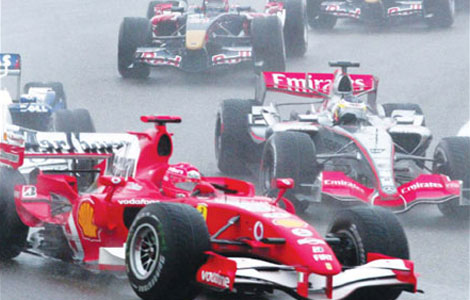
Green light
F1 sponsors expect lucrative returns from Shanghai pit stop
Preview of the coming issue
Buying into the romance
Born to fly
Specials

Share your China stories!
Foreign readers are invited to share your China stories.
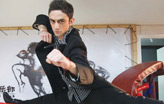
No more Mr. Bad Guy
Italian actor plans to smash ‘foreign devil’ myth and become the first white kungfu star made in China.
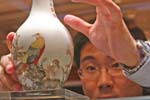
Art auctions
China accounted for 33% of global fine art sales.
